The Intel Skylake-X Review: Core i9 7900X, i7 7820X and i7 7800X Tested
by Ian Cutress on June 19, 2017 9:01 AM ESTBenchmarking Performance: CPU Encoding Tests
One of the interesting elements on modern processors is encoding performance. This includes encryption/decryption, as well as video transcoding from one video format to another. In the encrypt/decrypt scenario, this remains pertinent to on-the-fly encryption of sensitive data - a process by which more modern devices are leaning to for software security. Video transcoding as a tool to adjust the quality, file size and resolution of a video file has boomed in recent years, such as providing the optimum video for devices before consumption, or for game streamers who are wanting to upload the output from their video camera in real-time. As we move into live 3D video, this task will only get more strenuous, and it turns out that the performance of certain algorithms is a function of the input/output of the content.
HandBrake H264 and HEVC
As mentioned above, video transcoding (both encode and decode) is a hot topic in performance metrics as more and more content is being created. First consideration is the standard in which the video is encoded, which can be lossless or lossy, trade performance for file-size, trade quality for file-size, or all of the above can increase encoding rates to help accelerate decoding rates. Alongside Google's favorite codec, VP9, there are two others that are taking hold: H264, the older codec, is practically everywhere and is designed to be optimized for 1080p video, and HEVC (or H265) that is aimed to provide the same quality as H264 but at a lower file-size (or better quality for the same size). HEVC is important as 4K is streamed over the air, meaning less bits need to be transferred for the same quality content.
Handbrake is a favored tool for transcoding, and so our test regime takes care of three areas.
Low Quality/Resolution H264: He we transcode a 640x266 H264 rip of a 2 hour film, and change the encoding from Main profile to High profile, using the very-fast preset.
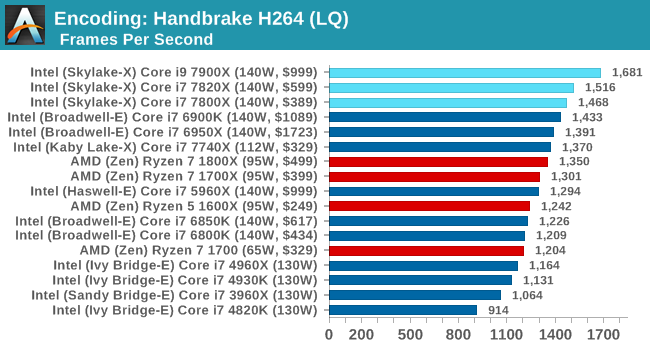
More cores, more frequency, more IPC, more fun: the Core i9-7900X wins here, and even the i7-7800X wins out against the Core i7-6900K.
High Quality/Resolution H264: A similar test, but this time we take a ten-minute double 4K (3840x4320) file running at 60 Hz and transcode from Main to High, using the very-fast preset.
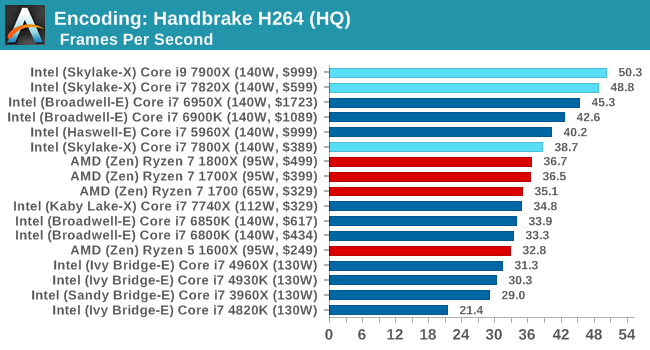
Moving into HQ mode means making the job more parallel, so the higher core counts stay at the top of the chart.
HEVC Test: Using the same video in HQ, we change the resolution and codec of the original video from 4K60 in H264 into 4K60 HEVC.
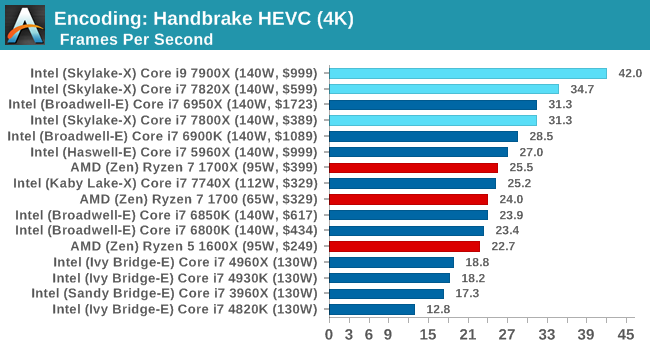
WinRAR 5.40
For the 2017 test suite, we move to the latest version of WinRAR in our compression test. WinRAR in some quarters is more user friendly that 7-Zip, hence its inclusion. Rather than use a benchmark mode as we did with 7-Zip, here we take a set of files representative of a generic stack (33 video files in 1.37 GB, 2834 smaller website files in 370 folders in 150 MB) of compressible and incompressible formats. The results shown are the time taken to encode the file. Due to DRAM caching, we run the test 10 times and take the average of the last five runs when the benchmark is in a steady state.
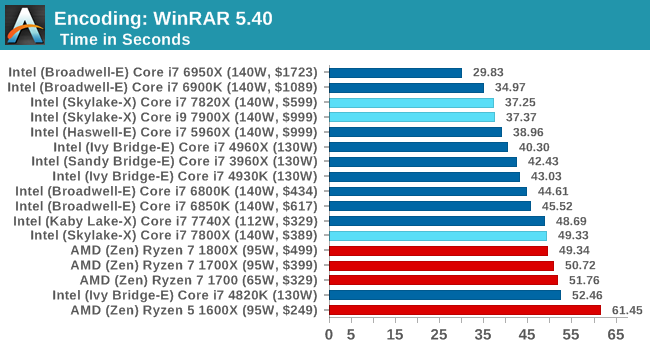
WinRAR loves having access to all the caches as much as possible, to prefetch and store data as needed. The Skylake-X chips fall back a bit here, even with DDR4-2666 support. The Core i7-7800X uses DDR4-2400 memory, so puts it further behind. Interesting didn't realise that the lower core count Broadwell-E chips were affected so much by this test, and the higher core count Ivy Bridge-E parts are faster here.
AES Encoding
Algorithms using AES coding have spread far and wide as a ubiquitous tool for encryption. Again, this is another CPU limited test, and modern CPUs have special AES pathways to accelerate their performance. We often see scaling in both frequency and cores with this benchmark. We use the latest version of TrueCrypt and run its benchmark mode over 1GB of in-DRAM data. Results shown are the GB/s average of encryption and decryption.
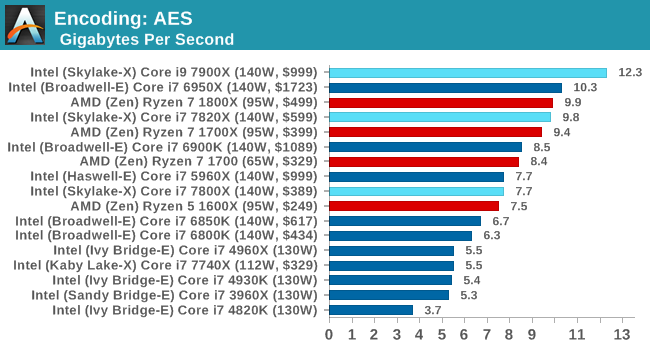
7-Zip
One of the freeware compression tools that offers good scaling performance between processors is 7-Zip. It runs under an open-source licence, is fast, and easy to use tool for power users. We run the benchmark mode via the command line for four loops and take the output score.
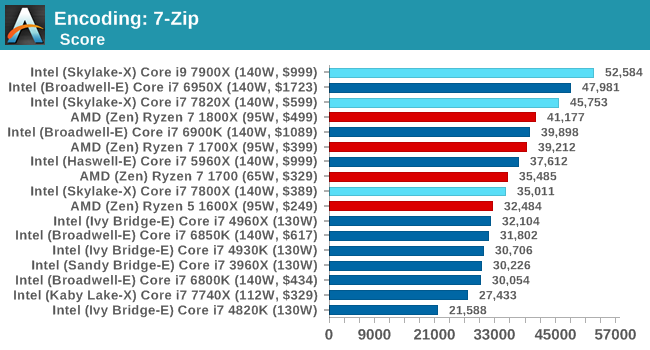










264 Comments
View All Comments
Icehawk - Monday, June 19, 2017 - link
I'm curious to see AMD's response w/Threadripper but the 7820 is looking like the next CPU for me, I'm still on a 3770k and while it is just fine for gaming I've been converting all of my media to x265 and need a lot more muscle to speed that along. I do wish that heat was better controlled as my current system is near silent with a fanless PSU, an AiO water cooler, no mech drives, etc and overclocked to 4.4ghz.Pieter123456 - Monday, June 19, 2017 - link
Funny how you did not hold of on making a verdict when there were bios and 1080p gaming issues with ryzen launch??!Flying Aardvark - Monday, June 19, 2017 - link
Intel pays well for such courtesies. AMD, not so much. I heard people saying Ryzen was released defective.So the conclusion that AT should be making is that the new i7 and i9 lineup was released as defective.
tamalero - Monday, June 19, 2017 - link
I heard you, I still remember how fanboys and some "socialites" of the hardware sites bashed AMD nonstop on other issues, like the voltage issues on the Polaris chips.Nvidia has a problem too, and they arent even close to be that harsh.
Ryzen's cache issue? THE WORLD IS ENDING FOR AMD!!!
Intel's drop in performance core per core in some things? "not that bad, balance, etc..etc.."
Gothmoth - Tuesday, June 20, 2017 - link
the biggest issue is this insane heat skylake-x produces when overclocked.the bios issues can be resolved.
that anandtech is more biased towards intel should come as no surprise.
tamalero - Tuesday, June 20, 2017 - link
I noticed that, there is a huge difference in the wording on this article vs the one in tomshardware.And both show very different outcomes.
Specially in overclocking and power consumption. Where the corei9 is ridiculously inefficient.
Luckz - Tuesday, June 20, 2017 - link
"there is a huge difference in the wording"And knowing Tomshardware from decades ago, I would have expected the exact opposite.
Ryan Smith - Tuesday, June 20, 2017 - link
To be clear here, our Ryzen article didn't have any gaming coverage either.http://www.anandtech.com/show/11170/the-amd-zen-an...
That launch was based solely on desktop usage & compute, in big part because there were so many weird things going on with gaming. In this article we actually went one step further by specifically recommending that gamers not buy SKL-X for the time being.
Gothmoth - Tuesday, June 20, 2017 - link
but no really critical word about the crazy temps.how i am supposed to cool this cpu on air?
and no real critic that intel uses stupid thermal paste..... overall the critical stuff like crippled PCI lanes need to be adressed more agressive.
tamalero - Monday, June 19, 2017 - link
The TDP differences are insane!